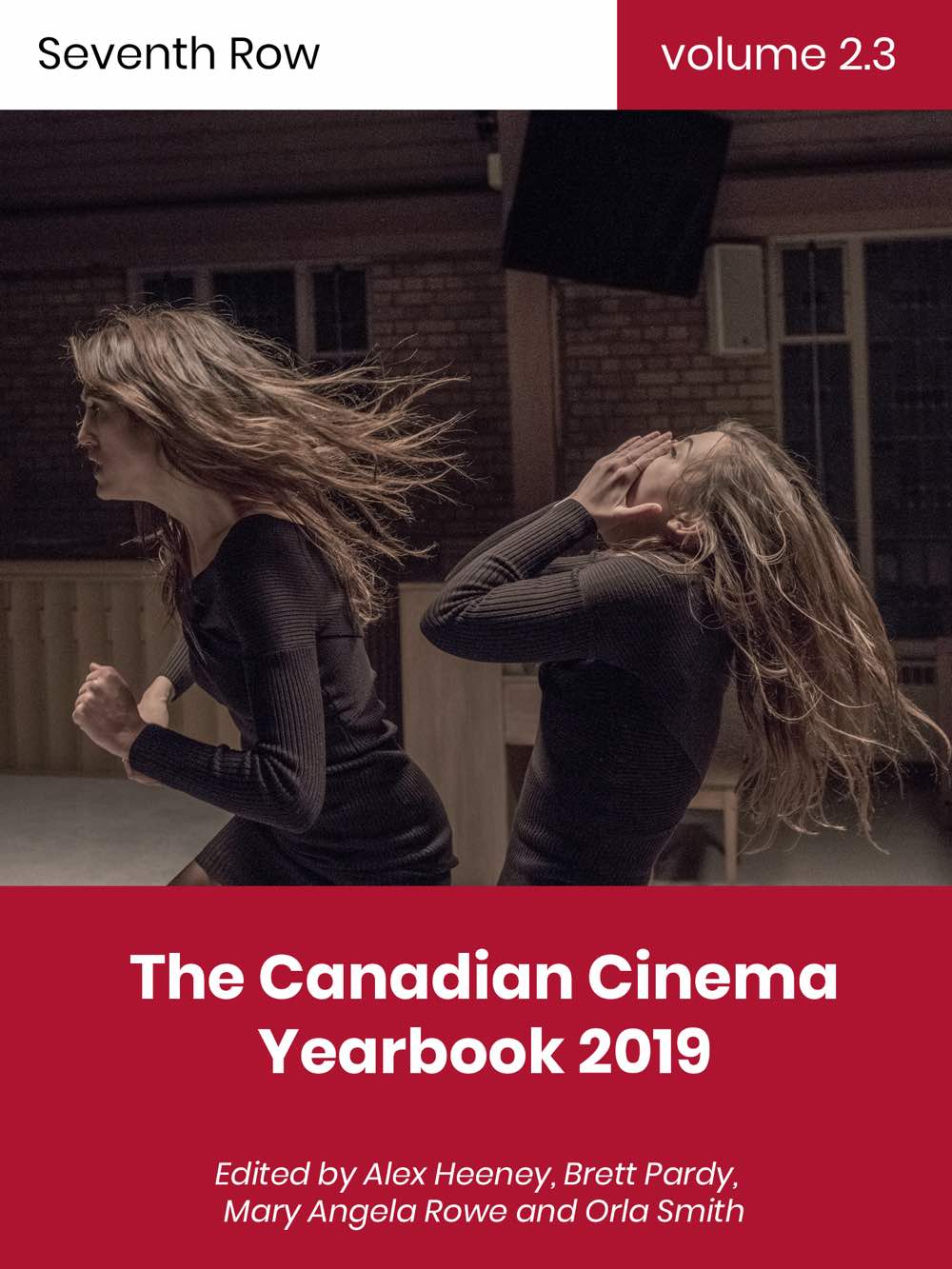Sanja Zivkovic on the tricky business of depicting mental illness on screen, how she directed her two talented lead actresses, and crafting the aesthetics of Easy Land. Read about more great Canadian cinema.
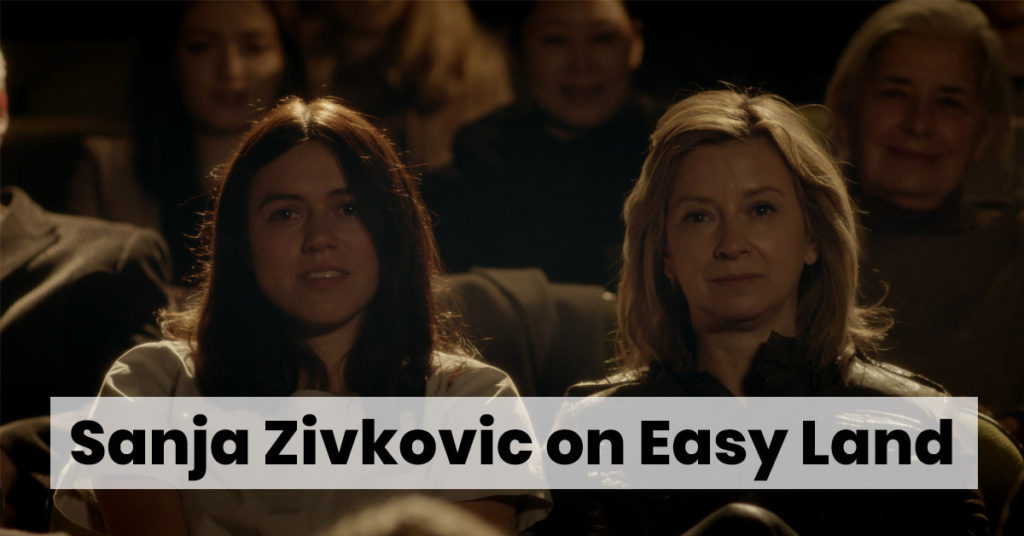
One of the best Canadian films of the 2019 Toronto International Film Festival was Easy Land, Sanja Zivkovic’s drama about a mother and daughter from Serbia living with the fallout of moving to Toronto several years prior. Zivkovic’s film is not just about the immigrant experience, but mental illness, burgeoning creativity, and how all these things and more can intermingle and make family life complicated.
Zivkovic’s film smartly charts how the various problems in the pair’s separate lives exacerbate and complicate each other. The film observes mother Jasna (Mirjana Jokovic) and daughter Nina (Nina Kiri) as they clash with one another and the people around them. Jasna is a trained architect, but she can only find employment as a secretary. Her prospects gradually disintegrate as her struggles with an unnamed, bipolar-like mental illness grow tougher and tougher, especially as Jasna has little in the way of a support system. The only person she can lean on is her teenage daughter, and Nina is too young to shoulder such a burden. Nina is a loner at school and grows more and more resentful of her mother, ultimately begging to move back to Serbia. But Nina eventually finds purpose in helping to direct the school play, realising that she enjoys the act of taking creative directorial control.
Back at TIFF ‘19, I spoke with Zivkovic about the tricky business of depicting mental illness on screen, how she directed her two talented lead actresses, and crafting the film’s aesthetics.
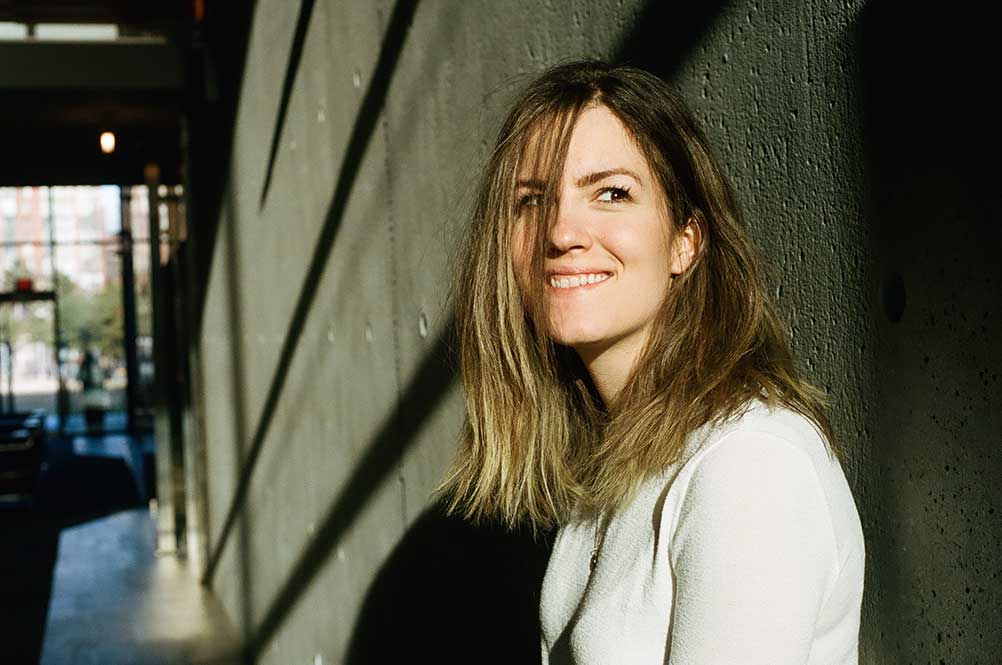
7R: What was the genesis of Easy Land?
Sanja Zivkovic: I made a short film called Cleo in 2016 which premiered at TIFF. We shot that in this immigrant neighbourhood that reminded me of my own past. Cleo was from an outsider’s point of view. It was about this girl that wandered in and was experiencing this for the first time.
But being in that neighbourhood, I realised that this was like my story. I grew up like this; this is how it felt for me when I first came to Canada. It inspired me to write a film about Serbian immigrants that come to Canada. I specifically wanted to tell a mother-daughter story because of my experiences with my own mother. Not that the film’s autobiographical, but it was just something that I felt compelled to do at that moment.
The story is about this mother who comes to Canada to make a better life for her daughter, but [the mother] struggles from mental illness. Her daughter wants to go back to Serbia but can’t because they are codependent. She can’t leave her mom; her mom can’t leave her. It’s this intimate family drama that explores this intersection between immigration and mental health. These are themes that are really important to me as a Serbian immigrant and as someone who’s seen such things happening within my community.
7R: When you’re making a film at least partly inspired by things you’ve experienced, is it hard to know when to fictionalise and when to draw from your own life?
Sanja Zivkovic: It’s very hard. On one hand, it was easy to write this film because everything was so familiar to me; it’s not like I had to do a lot of research.
Except for the mental health stuff. I really wanted to get that right, because I’m not a doctor, so I talked to psychoanalysts for a year. Also, I had a friend who was going through something like that, so I consulted with her.
As for the other aspects, it was quite easy. But at some point, you have to draw the line. My own story: I came to Canada with my mom, my dad, three brothers. We’re a big family. It’s not literally this film.
At what point do you have to fictionalise? I thought of the plot of Easy Land, with this [architectural] model that the mom’s creating. It’s kind of like this naive representation of her hopes and dreams in Canada. That part was completely imagined. But again, I feel like it’s something that I could relate to, just through this metaphor.
7R: What did you learn from the psychoanalyst that informed your depiction of the mother character? What trappings did you want to avoid?
Sanja Zivkovic: I knew I wanted there to be a mental health aspect, and right away, I gravitated toward bipolar [disorder], because that’s something I’ve seen and talked to people about. But on the other hand, I didn’t want to ever say in the film, “She has bipolar.” There’s a section in the film when she’s talking to her therapist, and the therapist at one point mentions, “Your symptoms of bipolar…” In the edit we actually took it out and just replaced it with “Your disease,” because I didn’t want to trap it in just this one aspect.
I wanted more people to be able to relate to it. People who are maybe undiagnosed or who are going through some kind of clinical depression [can relate to the character]. There are many things that people could relate to about Jasna, and I didn’t want to call it one thing. Although, of course, the actress was playing bipolar [specifically]. She did a lot of research.[The character] is taking medication as a person would for that disease, specifically.
7R: You have these two really talented actresses playing mother and daughter in the film. How did you cast them? And did you get to work with them on their bond before shooting?
Sanja Zivkovic: That’s actually a really interesting story. The main character’s name is Nina, and the actress playing her is called Nina Kiri, so clearly I had Nina in mind. Nina and I had already done a film before [the short film Cleo]. I knew that I wanted to cast Nina, but I could not cast Nina until I found a mother that would work well with her, because that’s the heart of the story.
I contacted Mirjana Jokovic through her email, which I got through some other contacts in Serbia. We were exchanging emails for about six months. She read the script, and she was interested, but she was really busy. She’s teaches a bunch of classes in a masters program in acting, so it wasn’t a sure thing. About two months away from when we actually shot, I was like, “What are we going to do?! How are we going to know if she can work with me?”
As luck would have it, because Nina’s in The Handmaid’s Tale, she happened to be in LA, and Mirjana lived in LA. I bought a one-way ticket to LA, and I was just hoping that Mirjana would find time for us. I remember sitting by my phone for two days and just staring at it I went to the beach, and I got a tan, and that was really nice! [laughs]
But it was just like, “Is this going to happen or not?” Nina was on standby, and she was like “So, has Mirjana called?” And then finally, Mirjana called, and she was like, “Why don’t we meet at this restaurant?” So me and Nina walk up to this restaurant, and Mirjana sees us, and we know what she looks like because she’s super famous, but she had no idea. She sees Nina, Nina sees her, and she stands up, and they embrace like they’ve known each other forever. I just stood back watching them like, “We’re making this movie.”
I like to talk to actors a lot before and make sure that we have the same ideas about the characters. But we didn’t have any rehearsals. After LA, Nina and I went back to Toronto. Nina and I sat for weeks, and we talked about the script and went through every single line. With Mirjana, I just had a few phone conversations, and I was like, “Do you want to record anything and send it to me?” And she was like, “Just trust me; I’m going to get there on the day.” I was pretty nervous, but as soon as they started, I felt we made all the right decisions. It was so good to know that because you don’t really know until it all starts.
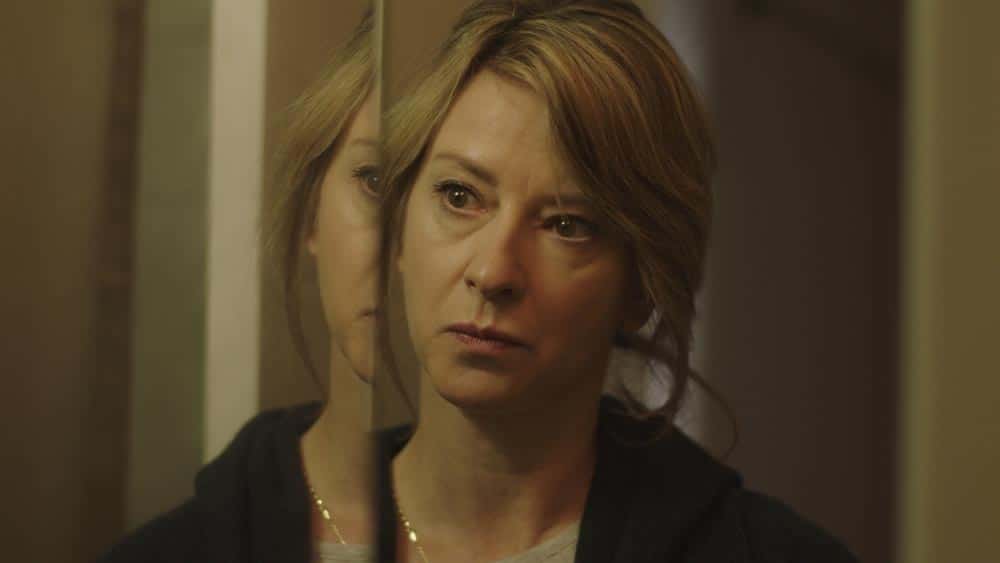
7R: When you cast Nina and Mirjana, did the characters change much from the script?
Sanja Zivkovic: What’s interesting is when I first imagined the script, I imagined them as very recent immigrants. But Nina Kiri’s been in Canada for many years, so she speaks Serbian fantastic, but she has an accent like she’s lived here for a while. So instead of it being a story where they moved here yesterday, which it could have been had I cast someone else, they’ve been here for a few years, and they still struggle, which actually made it much more powerful.
As for Mirjana, she really liked the script, and I don’t think we made many changes — maybe slight things in dialogue. She has great input about all of it. But she really liked the script and respected it. I was always like, “What do you think?! Are you happy?” and she was like, “This is your vision. I am, but it’s about you.” So that was an amazing attitude that gave me freedom.
7R: How did you work with your cinematographer, Maya Bankovic, to devise the aesthetic of the film?
Sanja Zivkovic: Working with Maya Bankovic was definitely a highlight of this film. She’s amazing. She’s done work all across the board from documentary to very stylised films. When I came to her and I was like, “Hey Maya, I want to do something really low key, handheld,” I thought she was going to say, “No.” But she was completely supportive. She was like, “I understand where you’re coming from. I think we should do it that way.”
That may not be the popular way of shooting now. Everything kind of looks like Netflix these days: it’s all locked off and beautiful and high-key lighting and all these different colours. But I was like, “No, I want to keep it minimalistic. I want to keep it raw. I want to keep it gritty.” Maya completely understood that.
For a lot of the people on the film, it was their first film, like for me and for [producer] Julie [Strifler]. But for Maya, this was her 10th film or something, so she was able to contribute with her experience, as well. I remember talking to her and asking, “What advice would you have for first-time feature film directors?” And she was like, “Well, it just seems like because they’re so used to doing shorts, everything is like a sprint, and then they burn out halfway. Remember, it’s a longer thing; it’s a marathon. Try to pace yourself and not burn out.” That really helped me get through.
7R: The character of Nina is a young person who’s outcast and disillusioned. How did you work with costume designer Kristin Somborac to work out how she would look? Obviously, the things that young people wear are very important to their self-expression.
Sanja Zivkovic: That’s actually really interesting, because Nina the actress, is very different from Nina the character. She had no clothes that she owned that would work for the character. Also, she’s a little bit older. It was a bit of a challenge to bring her back to those years.
We had a costume designer who was great and brought in a lot of the stuff, but me and Nina also went to Value Village together, and we would pick out things together. She has a great sense of the character, because she grew up in Burnaby, and I grew up in Vancouver, which are side by side. So she understood the world that I wrote really, really well. She was like, “Nina would wear this. Nina would do this. Nina would do that.” We went through line by line, and she’d be like, “I think this might be a little bit too sophisticated for Nina.” I went back in my life about 15 years, and Nina went back in her life about 10 years to do that.
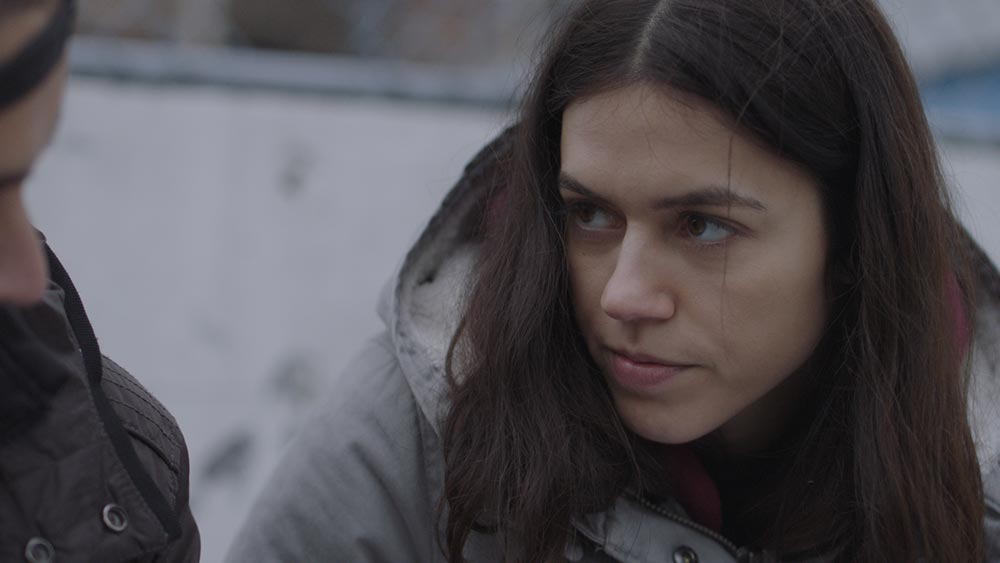
7R: The heart of the film is this mother-daughter relationship, and the apartment they live in together reflects that. How did you work with your production designer to create that space?
Sanja Zivkovic: That apartment is so funny! We had another apartment which was a little bit smaller and a little bit slicker-looking, which I actually wasn’t crazy about, but we had settled on that. The production designers were going to make it more rugged and more lived in and bring in all these elements from Serbia.
Then, we lost that apartment two days before the shoot, and we found this one last minute. We walked into this apartment, and it was actually too much! It was too rugged. The people there were like hoarders, so they had so many things. Two of the bedrooms were full of their things!
I have some relatives who live in Toronto, and I literally borrowed everything from their house. Bless them so much for helping me out, because all those things are their belongings from when they moved to Canada 30 years ago that they’ve been saving. It was very personal things in that apartment that helped give it that vibe. Also Maya Bankovic, who is Serbian-Canadian, got her mom to give her a painting of Belgrade that she did, and it’s in a lot of the shots. We all contributed.
7R: What are you working on next?
Sanja Zivkovic: I have a few scripts. I have this one project that I’ve had for seven years or so. It’s a Serbian-Canadian co-production, and it’s already gotten development funding from the film centre in Serbia, and it’s got support from the Canada Council [for the Arts]. So that’s something that I’m going to keep developing. But it’s so big that I keep on pushing it back because there’s so many things that are a little bit easier to do.
I’m also writing another film that’s quite personal to me. I’m not ready to talk about it yet because I really want to flesh it out. But I feel like that’s going to be my next film because it is a Canadian film, and it also explores themes that are important to me in Canada.
